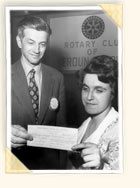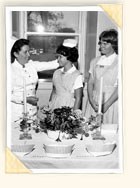 The 1960s: The Golden Age of Volunteering The 1960s: The Golden Age of Volunteering
Shift to Individual Volunteering
In the early 1960s, the Volunteer Department welcomed over 50 groups—service organizations, scouts, guides, colleges, companies and more—all coming to the Douglas to improve patients’ lives. These included the Knights of Pythias, the Pythian Sisters, B’nai Brith, the Dalse Club, St. Clement's Church, St. Patrick’s Fraternity, and the Verdun Branch of the Canadian Legion.
By the 1970s, however, the in-patient population declined and care became more specialized. Group volunteering dwindled and individual volunteering took the lead. By 1986, over 400 individual volunteers were active throughout the Hospital.
Rotary Club Supports Rehabilitation
On March 3, 1960, the Rotary Club donated $50,000 for the construction for a residential
centre for patient rehabilitation—today’s Levinschi House.

Serving with a Smile
In the 1960s, large numbers of candy stripers lent a cheerful hand to nursing staff. They were young, compassionate, and full of energy.
Evening School for Patients
Around 1960, the Hospital opened the Verdun Protestant Hospital School for Patients. Five volunteer teachers and six volunteer assistants ran evening courses to help patients improve their education.
|